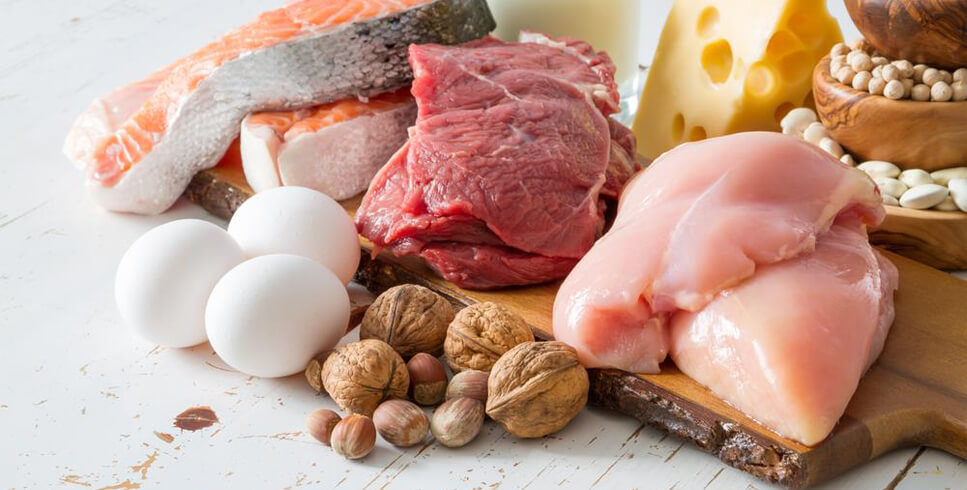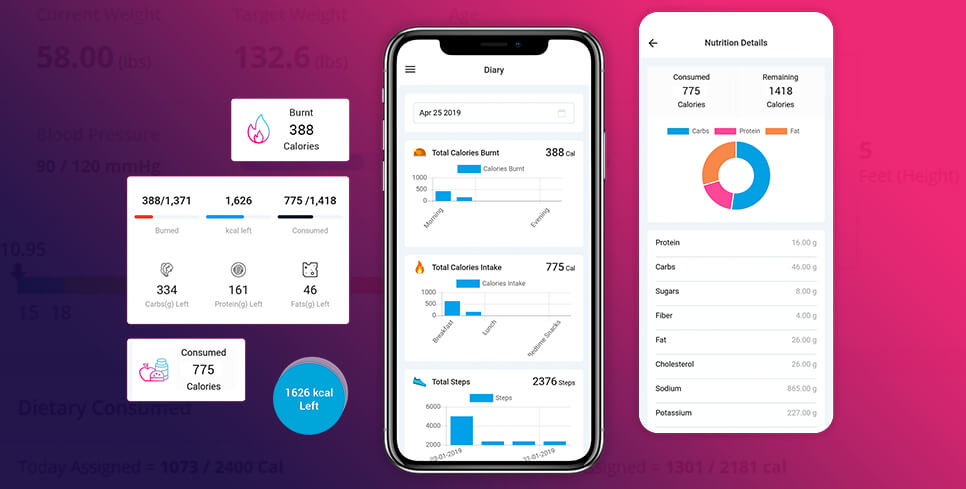The Importance of Protein in Your Diet

22
Protein – The Nutrition Source
Protein is a macronutrient, which is a nutrient that the body needs in large amounts to keep it functioning and to provide it with calories, which it uses for energy. Protein is one of three macronutrients — carbohydrate and fat are the other two. Proteins are the macronutrient and are an essential part of all living organisms, especially as structural components of body tissues such as muscle, hair, etc and as enzymes and antibodies. Proteins are composed of amino acids, which are organic compounds made of carbon, hydrogen, nitrogen, oxygen or sulfur. Amino acids are the building blocks of proteins, and proteins are the building blocks of muscle mass.
Protein Rich Diet & Its Benefits :
Almost all foods have some amount of protein in them, to varying extents. Protein in food can be divided into two categories: complete and incomplete. Common sources of dietary protein include beef, pork, poultry, seafood, eggs, beans/legumes, tofu, nuts and dairy products. The quality of protein is assessed through multiple methods such as the protein efficiency ratio, the protein digestibly, corrected amino acid score and the net protein utilization. Factors affecting protein quality include the amount of essential amino acids and the digestibility. Animal and dairy protein sources are highly digestible. Complementary proteins occur when at least 2 foods are combined and together contain all 9 essential amino acids required to make a complete protein. Examples include rice and legumes – rice is low in lysine but high in methionine – conversely, legumes are low in methionine but high in lysine. Other examples include peanut butter and bread, rice and lentils, etc.
Why should you care about making sure you get enough protein?
Protein is considered to be a building block of life — without it, our bodies wouldn't exist! We are made of protein from our heart to our brain, our bones to our muscles, our lungs to our kidneys, and our arteries, veins, skin, hair, nails, and more. Protein's main job is to build, maintain, and restore all of these muscles, organs, and tissues.
Most Interesting, Less Commonly Known Facts:
Acid-Base Balance – Protein buffer systems depend upon proteins, as opposed to nonprotein molecules, to act as buffers and consume small amounts of acid or base. The protein hemoglobin makes an excellent buffer. It can bind to small amounts of acid in the blood, helping to remove that acid before it changes the blood's pH. Many other proteins act as buffers as well.
Energy Source – Proteins are essential nutrients for the human body. They are one of the building blocks of body tissue, and can also serve as a fuel source. Protein-based foods provide the body with fuel to repair and build tissues. Protein takes longer than carbohydrates to break down in the body, providing a longer-lasting energy source. In deamination, the nitrogen is removed from the amino acid and excreted through the urine by the kidneys. In the human body, deamination takes place primarily in the liver, however glutamate is also deaminated in the kidneys. Then, the remnant carbon, hydrogen and oxygen are converted to carbohydrates or directly metabolized for energy.
Enzymes – Almost all biochemical reactions in living things need enzymes. Enzymes are proteins and enzymes are catalysts of chemical reactions in the body.
Hormones – Hormones are special chemical messengers in the body that are created in the endocrine glands. Some hormones, such as insulin, are composed of amino acids.
Immune System – Your body uses amino acids found in dietary proteins to help build proteins within your body including proteins that help make up your immune system. For example, immunoglobulins also called antibodies are proteins that circulate in your blood and make up key components of a strong immune system. Proteins are also part of antibodies, interferon and complement proteins that support immune system cells or attack viruses, bacteria, allergens, toxins or other foreign substances in your body.
Fluid Balance – The presence of blood protein molecules, such as albumins and globulins, are critical factors in maintaining and regulating the proper fluid balance between the blood and tissues. The lack of blood proteins results in clinical edema , or tissue swelling, because there is insufficient pressure to pull fluid back into the blood from the tissues. The condition of edema is serious and can lead to many diet, absorption, health, fat, nutrients, carbohydrates, vitamin, amino, acids, weight, water and amino acids.
Recommended Posts

14
The SIMPLYLOOSE App is one of TODAY's favorite Health and Fitness Apps
SIMPLYLOOSE is an advanced B2B Software as a service (SaaS) IoT platform which offers real-time online platform to health & fitness experts to train more customers and streamline their health and fitness training business by using cloud platform cost effectively. SIMPLYLOOSE platform offers mobi...

28
Is a Vegetarian Diet the Ultimate Fat Loss Diet for weight loss?
Losing weight has become a constant challenge for millions of people, and one that few seem able to conquer for good. According to many experts, the better way to lose weight might be going vegetarian. In recent years, millions of people have taken meat off their plates in order to finally meet the...

10
How to Build a Diet and Nutrition App from Scratch: Must have Features with API and Useful Development Tips
The arrival of technology has made our generation sedentary. Due to technology, the amount of physical work has almost diminished which is the root cause of various problems. According to a new study around 30% of world’s population is overweight or obese. The health consequences of overweight...









